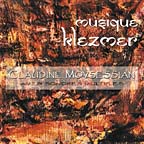Claudine Movsessian / Musìque Klezmer

Claudine Movsession
Ames sonores multiples
Musìque Klezmer, 2004
www.movsessian.fr.fm
This is the most traditional American klezmer album I have heard from France, although that applies only to the klezmer component of this intriguingly broad melange of world musics. This is not an American klezmer album. Rather, French clarinetist Claudine Movsessian has gathered friends and created something quite different.
Opening with Movsessian's clarinet driving an entirely respectable "Heyser Bulger", the band adds some Rom fiddling to "Oi mama, bin ich verlieb". I am less fond of the vocals, but the band is excellent. (I am similarly unimpressed by the attempt to transition nigun to art song in the intro to "Dudele"—but these are the only tunes that don't really work for me.) By the time we get to the end of the "Suite roumaine" I realize that I am listening to improvisation and a pushing of the edges that is very different from American klezmer. Then the eastern drumming begins.
Movsessian, who fronts several klezmer and Yiddish ensembles, has gathered musicians from around the world, as befits living in a country that is different diverse, but nearly as intensely multicultural as Canada. Thus, in addition to the klezmer, Yiddish song, and Middle Eastern rhythms, we have lively Rom chant, as on "Marinella", accompanied by klezmer clarinet krechts, and a very bluesy, quietly syncopated jazz composition, "Azad II". I also very much like the way the band starts gently and gradually builds up into a powerful "Le jour du Shabbath".
One of the songs that caught my attention is the deadpan vocal version of Molly Picon's "Abi Gesund". Indeed, while the accompaniment is quite traditional and Movsessian's clarinet screams delightfully, the verses are sung in a manner more reminiscent of the Flying Lizards than Yiddish Theatre. The Greek dance tune, "Karsilamas" begins sparsely, and gradually fills in under Movsessian's fluid clarinet and steady, measured percussion. The album ends with a very rhythmic "Mandilatos", a rather more percussive than traditional Black Sea dance.
There is a lot interesting happening on this album. If there are a couple of songs that didn't enchant me, there are several more than are unusually interesting. Movessian's clarinet is excellent. The percussion is also excellent, throughout. A fascinating album for fans of world klezmer.
Personnel this recording:
Claudine Movsessian: clarinette, clarinette basse, flûte à bec, chant
Mostafa Amidi Fard: percussions iraniennes (1, 2, 6, 7, 8, 9, 12, 13)
Pierre Cleitman: accordéon (3, 5, 9, 12)
Ema Deï: chant tzigane Roumanie (6)
Yorgos Karamitros: guitare (1, 2, 3, 5, 6, 7, 8, 9, 10, 12)
Bruno Lebris: contrebass (1, 2, 3, 4, 5, 6, 7, 8, 9, 10, 12)
Colette Lepage: violon (5)
Victor Nicolaev: accordeon (1, 6)
Yannis Vlachos: oud (13)
Tzvika Voltoch: percussions (4, 6, 8, 9, 11, 12, 13)
Karoline Zaidline: chant (12)
Effim Zoubritzki: violon (1, 2, 3, 6, 7, 12)
Songs
- Heyser bulgar freilach (trad., arr. Movsessian/Karamitros) 4:01
- Oi mammé (trad., arr. Movsessian/Karamitros) 4:05
- Suite roumaine (trad., arr. Cleitman) 4:01
- Zeibekiko (Movsessian) 6:39
- Route des acacias (trad. Hungarian, arr. Movsessian/Karamitros) 5:12
- Marinella (trad. Rom, arr. Movsessian/Karamitros) 6:24
- Firn mekhutonim ahey (trad., arr. Movsessian/Karamitros) 4:24
- Azad II (Movsessian) 5:43
- Le jour du shabbath (trad., arr. Movsessian/Karamitros) 6:47
- Aabi gesind (Picon/Ellstein, arr. Movessian/Karamitros) 3:29
- Karsilamas (trad. Greek, arr. Movsessian/Karamitros) 6:02
- Dudele (trad., arr. Movsessian) 5:19
- Mandilatos (trad., arr. Movsessian) 5:49

